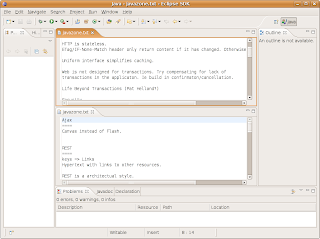The generalization of the day
I use the web to find solutions of my problems, as most people do today. I have noted a huge difference between two communities I am using, the Java and the Linux community. With the Linux community I mean it in a broad sense like Linux distributions and common software running on Linux like Postgres, Apache, Evolution, F-spot, Python etc. I.e classic open source software. When I search on a problem in the Linux area I most of the time get good hits with people having the same problem and good answers from people who knows how to solve it. The hits are on mailing lists, forums, and blogs. On the other hand when searching on problems around Java I most of the time find people who have the same problem, but no answers. I know this is a very big generalization but are anybody else experience the same? Why are people in classic open source more willing to help than in the Java world?

